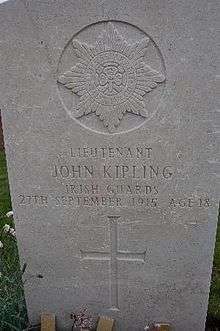John Kipling
| John Kipling | |
|---|---|
 John Kipling in the uniform of the Irish Guards, 1915 | |
| Born |
17 August 1897 Rottingdean, Sussex, England |
| Died |
27 September 1915 (aged 18) Loos-en-Gohelle, France |
| Buried at | St Mary's ADS Cemetery, Haisnes |
| Allegiance |
|
| Service/branch |
|
| Years of service | 1914–1915 |
| Rank |
|
| Unit | Irish Guards |
| Battles/wars | |
| Relations | Rudyard Kipling, father. Caroline Starr Balestier, mother. Josephine Kipling, sister. Elsie Bambridge, sister. |

John Kipling (17 August 1897 – 27 September 1915) was the only son of the British author Rudyard Kipling. He was killed in September 1915 at the Battle of Loos while serving with the British Army during the First World War, nearly six weeks after his eighteenth birthday.
He is a central character in the 1997 play My Boy Jack. He is portrayed by actor Daniel Radcliffe in the 2007 television film adaptation of the same name.
Biographical notes
Born in 1897, Kipling was the youngest of three children of the author Rudyard Kipling and his American wife Caroline Starr Balestier. He was born at "The Elms" at Rottingdean in Sussex, which was the Kiplings' home between 1897 and 1902. He was educated at Wellington College, Berkshire.
World War I
Kipling was 16 when the First World War broke out in August 1914. His father, a keen imperialist and patriot, was soon writing propaganda on behalf of the British government.[1] Rudyard sought to get his son a commission, but John was rejected by the Royal Navy due to severe short-sightedness. He was also initially rejected by the army for similar reasons.[2]
However, Rudyard Kipling was friends with Frederick Roberts, 1st Earl Roberts, commander of the British Army, and Colonel of the Irish Guards, and through this influence, John Kipling was commissioned as a second lieutenant into the 2nd Battalion, Irish Guards on 15 August 1914, having just turned 17.[3] After reports of the Rape of Belgium and the sinking of the RMS Lusitania in 1915, Rudyard Kipling came to see the war as a crusade for civilization against barbarism.[4] and was even more keen that his son should see active service.
After completing his training, John Kipling was promoted to lieutenant on 7 June 1915, and was sent to France in August along with the rest of the battalion, which was part of the 2nd Guards Brigade of the Guards Division.[5][6] His father was already there on a visit, serving as a war correspondent.[7]
The casualty rate amongst junior officers (or subalterns) in the trenches was extremely high, much higher than NCO's or other ranks. On average, a junior officer leading from the front survived six weeks before becoming a casualty - either killed or injured.[8]
Death
Kipling was reported injured and missing in action in September 1915 during the Battle of Loos. A shell blast had apparently ripped off his face. With fighting continuing, his body was not identified.
His parents searched vainly for him in field hospitals and interviewed comrades to try to identify what had happened. A notice was published in The Times on 7 October 1915 confirming the known facts that he was "wounded and missing".
The death of John inspired Rudyard Kipling to become involved with the Commonwealth War Graves Commission and write a wartime history of the Irish Guards. The poem My Boy Jack also alludes to the wartime loss of a son, although its themes are rather nautical.
Grave
The grave of Kipling was reportedly identified in 1992, and he is officially listed as buried in St Mary's ADS Cemetery in Haisnes.[9] In 2002, research by military historians Tonie and Valmai Holt suggested that this grave may be that of another officer, Arthur Jacob of the London Irish Rifles.[10][11]
In January 2016, however, further research, by Graham Parker and Joanna Legg, demonstrated that the original identification of the grave was in fact correct. In a statement, a spokesman for the Commonwealth War Graves Commission stated that it "welcomed the latest research which supports the identification of the grave of John Kipling".[12]
My Boy Jack
The play My Boy Jack was written in 1997 by David Haig. In 2007, it was adapted into a film of the same name, with Daniel Radcliffe as John Kipling.
References
- ↑ Bilsing, Tracey (Summer 2000). "The Process Of Manufacture of Rudyard Kipling's Private Propaganda" (PDF). War Literature And The Arts. Retrieved 15 August 2013.
- ↑
- ↑ The London Gazette: no. 29070. p. 1565. 16 February 1915. Retrieved 18 January 2016.
- ↑ Gilmour, David The Long Recessional: The Imperial Life of Rudyard Kipling, London: Farrar, Straus and Giroux, 2002 page 250.
- ↑ The London Gazette: (Supplement) no. 29363. p. 11161. 9 November 1915. Retrieved 18 January 2016.
- ↑ The Long, Long Trail |http://www.longlongtrail.co.uk/army/regiments-and-corps/the-british-infantry-regiments-of-1914-1918/irish-guards/
- ↑ Lawrence, W (6 June 2011). "Rudyard Kipling – author, poet and quintessential Englishman". GWL Magazine. Retrieved 10 May 2014.
- ↑ John Lewis-Stempel Six Weeks: The Short and Gallant Life of the British Officer in the First World War: The Life and Death of the British Officer in the First World War
- ↑ "Kipling, John". CWGC. Retrieved 20 January 2016.
- ↑ "'Wrong man' in Kipling son's grave". The Guardian. London. 4 November 2007. Retrieved 20 January 2016.
- ↑ Harrison, David (20 January 2002). "Kipling memorial 'on wrong grave'". The Daily Telegraph. London. Retrieved 20 January 2016.
- ↑ Furness, Hannah (19 January 2016). "Laid to rest, the mystery of dear son's grave that haunted Kipling". Daily Telegraph (p.11).